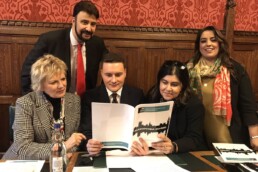As rejoinder to a critical article written by Ali Al-Arian for al-Jazeera, Dr Sherman Jackson (also known as Shaikh Abd-al Hakim Jackson) responded in a way that incisively points out a number of issues seldom so explicitly articulated today, where demagoguery pervades Muslim public discourse and the collective psyche. It’s difficult to argue against the idea that the Muslim space has become a noxious one; armed with a religiously weaponised ethno-religious identity and a reified Islam, revelation is left on the back benches (if not entirely discarded) and the Muslim outlook becomes one informed by identity politics and ethnic protest on the back of cherry-picked citations that make up a carefully crafted ‘tradition’ to buttress both in religious and political views. The apparent desire to publicly denounce Dr Jackson armed with little but supposition greatly suggests a motivation removed from providing a fair an informed critique. For many believers, what will customarily come to mind here is the divine injunction: “Believers, if a troublemaker brings you news, check it first, in case you wrong others unwittingly and later regret what you have done.” (Quran 49:6)
In this brief post, I intend to draw on Dr Jackson’s
incisive sentiments that I feel also speak to the British Muslim space,
as well as widespread British Muslim attitudes towards politics. Please note
that this post is not intended to be substantive but merely offer some paltry
thoughts limited to a few points Dr Jackson fittingly raises.
Demagoguery
Dr Jackson writes, “A common definition of a demagogue is one who gains
popularity by exploiting prejudice and ignorance to arouse common people
against elites, whipping up the passions of the crowd and shutting down
reasoned deliberation. Many Muslims now favor this approach to airing
differences precisely because they know (or hope) that it will completely
neutralize the only thing that could stand in their way: the teachings of
Islam!”
Shar’i illiteracy is not only widespread but has become an acceptable
norm in public discourse, where such illiteracy includes the inability to
discern faith-based discourse with substance from shallow utterings that merely
appropriate a religious veneer. For those informed of the Quran and sunnah, and
the variety of shar’i insights held by Muslim scholars for over a
millennium, the superficial peppering of rhetoric with cherry-picked verses or ahadith
– or a singular focus on the particular views of a handful of medieval scholars
formed in a dissimilar context are seen for what they are. But this is all assuming
that a disinterested reading of revelation is what many aspire for. In this
polarised world, “mention BDS, Trump, revolution, CVE or Black Lives Matter,
and the Qur’an and Sunna don’t stand a chance…anyone who invokes any of these
authorities will be dismissed as an apologist, while the demagogue crowns his –
or herself the defender of Islam!” (I’ve previously commented on such
defenders here.) Inevitably, critics of Jackson will derisively
respond that scholars such as Jackson think they know everything and believe
they’re the only ones who have the right to an opinion, which of course Jackson
hasn’t intimated, yet such inanity is predictable given that this is the level
of response to which we’re accustomed. Yet he does intimate the irony of such
people bullying or ‘demagoging’ people into accepting the notion that they (or
those they purport to represent) are the authority from whom we must get
permission to think or act as a Muslim. Such tactics are demonstrative of the
political power-plays by identarian Muslims who, as I wrote here,
heavily rely on a culture that has the “the laity disregarding the station of
actual learning, demoting the educated whilst propping up everyone else…in a
time when anyone can crowd the field of slogans with inanity…This misplaced
confidence merely empowers people who refuse to believe there are specialists
who might contradict them, nonchalantly dismissive in order to maintain an
immoderately high regard for their own intellects and partisan viewpoint.” As
Jackson rightly puts it, “there is much talk today about how scholars need to
be held accountable. Fair enough. But Al-Arian’s essay clearly
suggests that we need to expand that conversation to ask about the standards
to which non-scholars are to be held.”
Superficial analysis and faith-based interests
Dr Jackson is forthcoming in iterating his work amongst
Muslims and the forty odd years of efforts he has dedicated. Why? Is it simply hubris
and an emotive appeal for support? Certainly not. Amongst a few things, his
intent seems to be to highlight the questionable nature of Al-Arian’s
criticisms.
Firstly, to impugn on Jackson’s character and portray him as
some opportunistic charlatan seeking prominence is contradicted by the work Jackson
has done and the length he has done it for. The suggestion that Jackson has
aligned himself with, and lent credibility to, white supremacy is not only
offensive but absurd, and as he legitimately points out, “I don’t know any
Muslim who has been more explicit and eloquent in their critique of white
supremacy – from an Islamic perspective! — than I have. But its funny,
when Islam and the Blackamerican came out some fourteen years ago,
many in the immigrant community condemned me for trucking the ‘alien concept of
race’ into the discourse on Islam in America, as if I had abandoned Islam for
the NOI. But then, as soon as they found a way to ‘weaponize’
this critique for their purposes, it gained acceptance and they became
the champions of anti-white supremacy.”
Secondly, unlike many armchair critics and those vying for attention, actually engaging the people you speak of (the Muslim community here) and serving God’s cause through works rather than mere opinion means you more accurately identify their real lived concerns and aspirations, rather than co-opt them into yours and appropriate them for your narrow outlook. An example Dr Jackson provides is that of CVE (Counter Violent Extremism), where he once told a Blackamerican brother about the CVE controversy. “His response to me was: CVE? What’s that?” Similarly in the UK, the vast majority of Muslims have everyday concerns that transcend the government’s extremism policies. Financial challenges, marriage issues, raising godly children, and navigating the effects and influence of a godless culture on believers working and socialising in various realms greatly pervade the faithful’s concerns. Ask any community imam or da’ee what the majority of Muslims they minister to worry about and they won’t say PREVENT. And whilst many like Al-Arian criticise those like Jackson they fail to recognise the holistic nature with which he and those like him address political issues. Such critics, with a warped sense of being principled, seldom (if ever) directly address the inequality and trenchant racism found in their own mosques and other ethno-religious institutions they’re members of. For all the talk of Muslim women suffering the effects of disgraceful counter-extremism policies, they remain silent on the ethno-cultural treatment of Muslim women within their own communities. My point isn’t that they agree with such norms or practices, but the commitment to being principled seems to lack totality – it’s only one (and even then not a major) aspect of mistreatment or suffering they’re actively concerned with – that which the ‘white man’ perpetuates. As Dr Jackson correctly identifies, many of them “are simply angry at white people” and caught in a loop of post-colonial trauma.
Of course, that’s not to say that the UK government’s
extremism policies aren’t deeply flawed from a number of perspectives (including
colonial attitudes within the establishment) that require a robust confrontation
by bodies needed to organise such work, but the idea that our primary
problem is securitisation or electoral politics is deeply flawed – it is “the
fact that the socio-cultural reality that now engulfs us is one in which
Muslims – especially young Muslims — struggle to find meaning and relevance in
Islam.” This crisis for us in the UK isn’t new, and for a while it has been
masked by the politicisation of Muslim identity which employs immigrant
supremacy to gain traction amongst immigrant communities.
Political maturity
I believe it’s self-evident that Muslims suffer from the
absence of a grounded political culture, where they have opted for a hodgepodge
of various contemporary ideologies to substantially inform their activism.
I frequently hear of the frustrations of those actually engaged with the
political realm, for them the immaturity of many Muslims couldn’t be more real.
There will always be variant views on how to deal with the political challenges
of the day, but the banal rhetoric of many “almost always includes an attempt
to enshrine one perspective on Islam…as the litmus
test for all Muslims.” Having decided on their perspective, they arrogate
to themselves the right to judge everyone on that basis. Furthermore, such
advocates often rely on false consensuses on which they base their indictment
of Muslim leaders. Whilst Jackson explains this in the context of the US, here
in the UK it’s also rather evident. Some Muslims voted for the Conservatives
(and even support the newly chosen Boris Johnson as PM) as opposed to what is
supposedly conventional support for Labour, and many Muslims I have met espouse
some degree of support for counter-extremism strategies. This is not to say I
agree with them, but purported declarations of consensus intended to enshrine their
perspective are illegitimate.
Yet the puerility I find most impressive is on political
engagement. Where some Muslims opt for non-engagement or protest, there
is the belief that everyone should – and if they don’t, they fail the
litmus test. This immature supposition fails to recognise the complex nature of
politics and communal decision making, and a holistic approach that seeks to
tackle problems from different angles. There’s no contradiction in working both
angles, from within and without, and both are very much needed. Jackson
clearly put it that “while I believed I was right to be on the inside doing
what I could, if others thought that CVE was wrong they should be on the
outside protesting like hell! This, in my view, is the way mature
communities sometimes have to do things: its Malcolm and Martin;
its chess, not checkers!”
The problem ultimately is not that there is a plethora of views amongst Muslims but the way in which the debate is framed and how Dr Jackson and others are caricatured by unequals who evidently have little idea of what goes on behind closed doors (a lack of experience) nor able to demonstrate a perceptive intellect. What is becoming a crisis is the way intelligent, insightful and godly minds are being vilified for their acumen and the courage to navigate very complex spaces (may God protect them), yet as the exemplar Sufyan al-Thawri put it, “there is a time coming in which people will only succeed by being obtuse.” (Ibn Abi Dunya, Kitab al-Aql)
Of course, there’s much more to say on each of these points
(books could be written!) and my post only adds paltry thoughts with the
intention to start the conversation.
The more substantial point I intend to explore is immigrant Islam, which I feel not only contributes to the unenviable situation British believers find themselves in, but an exploration of which forms part of the narrative that might provide constructive steps for moving forward. For this reason, I plan to address immigrant Islam independently as a project, and at far greater depth than the brief thoughts articulated here.




